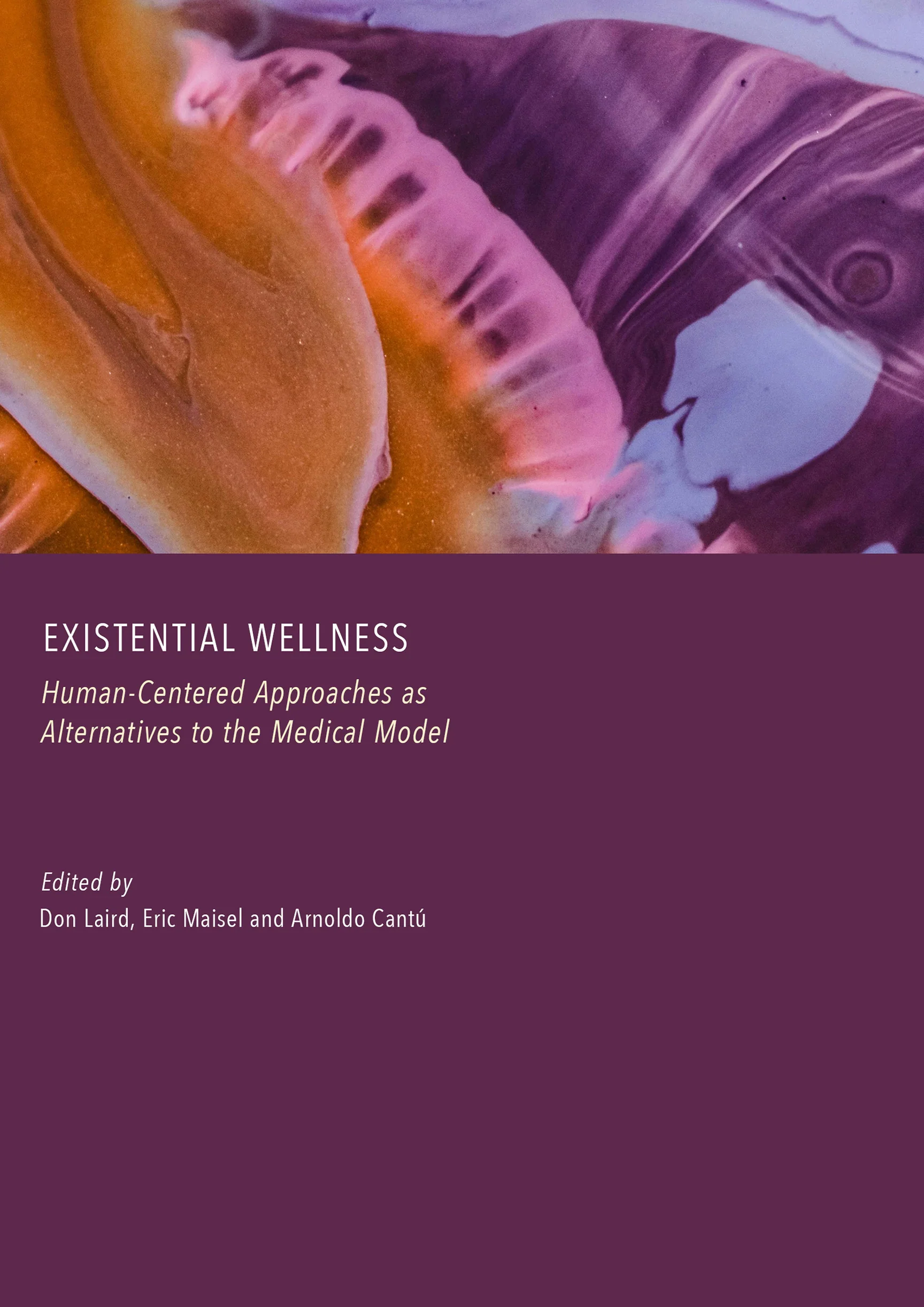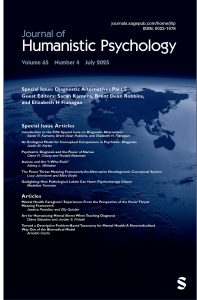8th Volume of the Ethics International Press Critical Psychology and Critical Psychiatry Series!
 Existential Wellness provides the first-ever comprehensive look at how existential ideas and practices function as powerful and ethical alternatives to the medical model of “diagnosing and treating mental disorders.” Existentialism presents certain ideas about what it means to be human, about the tasks and challenges of being human, and about ways in which individuals flee from and avoid those tasks and challenges. It has its favorite vocabulary, just as other bodies of thought do, including words like suffering, despair, anxiety, absurdity, uncertainty, freedom, authenticity, and personal responsibility. The meeting of two threads, the existential and the therapeutic, gave rise to existential therapy, existential psychiatry, and existential coaching. Practitioners who added the word “existential” to their self-description shared certain beliefs about what helping was all about.
Existential Wellness provides the first-ever comprehensive look at how existential ideas and practices function as powerful and ethical alternatives to the medical model of “diagnosing and treating mental disorders.” Existentialism presents certain ideas about what it means to be human, about the tasks and challenges of being human, and about ways in which individuals flee from and avoid those tasks and challenges. It has its favorite vocabulary, just as other bodies of thought do, including words like suffering, despair, anxiety, absurdity, uncertainty, freedom, authenticity, and personal responsibility. The meeting of two threads, the existential and the therapeutic, gave rise to existential therapy, existential psychiatry, and existential coaching. Practitioners who added the word “existential” to their self-description shared certain beliefs about what helping was all about.
Editors:
Don Laird, NCC, LPC is the founder and owner of eTalkTherapy, LLC and is an adjunct professor at Carlow University in Pittsburgh, Pennsylvania.
Dr. Eric Maisel is a former family therapist, based in California, USA, who works actively as a creativity coach. He is the author of many books on creativity, psychology, and mental health.
Arnoldo Cantú, LCSW is a clinical social worker and psychotherapist with experience in school social work, private practice, community mental health, and currently working in primary care behavioral health.
Soteria House Opens in New Mexico! – Executive Director Wanted
 Soteria Las Cruces is a newly-funded start-up program in Las Cruces, New Mexico. Soteria is a residential treatment setting for adults, 18 years of age and older, experiencing intense mental health challenges (i.e. psychosis), especially individuals in the early stages of crisis who may not benefit from traditional hospitalization. Soteria is a home-like setting where people receive support and affirmation while experiencing a psychotic episode. The Soteria approach is based on the concept of ’being with’ the individual rather than ’doing to’ them. The primary mode of treatment is one of relationships and psychosocial approaches and supports.
Soteria Las Cruces is a newly-funded start-up program in Las Cruces, New Mexico. Soteria is a residential treatment setting for adults, 18 years of age and older, experiencing intense mental health challenges (i.e. psychosis), especially individuals in the early stages of crisis who may not benefit from traditional hospitalization. Soteria is a home-like setting where people receive support and affirmation while experiencing a psychotic episode. The Soteria approach is based on the concept of ’being with’ the individual rather than ’doing to’ them. The primary mode of treatment is one of relationships and psychosocial approaches and supports.
This is a newly funded start-up program and, as such, comes with the excitement of start-up and the opportunity to build from the ground up. With staff support, residents are encouraged to engage in community activities and role recovery (student, worker, family member) as they are able.
The Director role is crucial to the success of our program. Our Director will provide clinical, fiscal, and human resources oversight for the entire operation along with a strong commitment and passion for the Soteria vision. We are seeking someone with extensive lived experience and experience working in a nonprofit management position and/or in the field of behavioral health. Certified Peer Specialist and/or eligible licensure as a Psychiatric Nurse, Psychologist, Psychiatrist, or related fields are highly desirable but not required. All non-independently licensed providers will be supervised by a board approved clinical supervisor. The Director will also have a close working relationship with the Behavioral Health Services Division of the State of New Mexico. The salary is in the range of $80,000 - $90,000 per year
To apply for this position, please click on the link below and send a cover letter and resume to our Director of Employee Services, Donna Macomber-Cassidy dmcassidy@kivacenters.org and our Soteria Las Cruces Consultant, Susan Musante susanmusante@hotmail.com.
JHP Special Issue
 Check out the Journal of Humanistic Psychology and its 5th Special Issue on Diagnostic Alternatives. ISEPP's own Arnoldo Cantú closes out this special issue with "Toward a Descriptive Problem-Based Taxonomy for Mental Health: A Nonmedicalized Way Out of the Biomedical Model."
Check out the Journal of Humanistic Psychology and its 5th Special Issue on Diagnostic Alternatives. ISEPP's own Arnoldo Cantú closes out this special issue with "Toward a Descriptive Problem-Based Taxonomy for Mental Health: A Nonmedicalized Way Out of the Biomedical Model."
ISEPP Webinar June 28th, 2pm EDT
 Don't miss out on our ISEPP webinar, titled "" Join us on June 28th at 12pm EDT as Joe Tarantolo, MD, David Walker, PhD, and Al Galves, PhD engage us in a discussion about the harms of biopsychiatry and its belief system. 2 CE credits. Click here to register now!
Don't miss out on our ISEPP webinar, titled "" Join us on June 28th at 12pm EDT as Joe Tarantolo, MD, David Walker, PhD, and Al Galves, PhD engage us in a discussion about the harms of biopsychiatry and its belief system. 2 CE credits. Click here to register now!
Summit on Veteran Overprescribing

Summit on the overprescription of psychiatric drugs to veterans and military members. What a lineup!
Wednesday, June 4:
6:00 PM - Pre-Event Medicating Normal- Filmscreening/Panel Discussion: Kellogg Conference Hotel Theater at Gallaudet University
Thursday, June 5:
9:00 AM - Press Conference: House Triangle Sponsored by Congressman Jack Bergman
9:15 AM - Irreverent Warriors "Hike to Heal" to National Mall for Skull of Sacrifice Remembrance Ceremony
12:00 PM - Roundtable Discussion with Panelists: US Capitol Visitors Center SVC 212-10
- Dr. Peter Gøtzsche – Physician, researcher, and co-founder of the Cochrane Collaboration
- Robert Whitaker – Investigative journalist, author of Anatomy of an Epidemic, and founder of Mad in America
- Kim Witczak – Global drug safety advocate, marketing executive, and former member of the FDA’s Psychopharmacological Drug Advisory Committee
- Dr. Josef Witt-Doerring – Board-certified psychiatrist, founder of the Taper Clinic, former FDA regulator, and clinical researcher at Janssen
- Angela Peacock – MSW, CPC, – MSW, CPC, Combat Veteran, Psych Drug Withdrawal Consultant, Veteran Advocate, Coach
Hot Off the Press – Seeking Soteria
Seeking Soteria is a candid and compassionate memoir by Eugene Larkin, one of the original staff at Soteria House—a groundbreaking project offering humane, relationship-based alternatives to psychiatric hospitalization. Larkin blends vivid recollections with reflections on mental illness, transformation, and what it means to truly be with someone in crisis. A call to rethink care, the book honours the quiet power of presence, relationship, and community in healing.
Two New Mad Camps
Mad Camp is an innovative approach for those with extreme states and experiences, and who want support and understanding outside traditional psychiatry. The past two in 2023 and 2024 were each a resounding success. The 2025 schedule is July 3 - July 7 in Austria; and July 31 - August 4 in Middletown, California. Read more and sign up!
Read Mad in America's story about the program.

Flying While Depressed? The FAA’s Troubling New Antidepressant Standards
This past April, the FAA loosened its standards regarding pilots' use of antidepressants. However, "...expanding pilot use of antidepressants flies in the face of mounting evidence of serious adverse effects associated with antidepressants. There is ample reason to question whether any antidepressants should be approved for pilots."
Flying While Depressed? The FAA’s Troubling New Antidepressant Standards
CANCELLED: 26th Annual ISEPP Conference
![]()
Due to circumstances beyond our control, we had to cancel this year's conference.
Conscious Clinician Collective
Check out a new collective of ethical practitioners and consider joining. The Conscious Clinician Collective was recently launched. According to the website:
Our bold mission is to cultivate a community where individuals and families engage with ethical mental health specialists and ALL healthcare professionals dedicated to upholding the principles of informed consent, medical freedom, and respect for personal autonomy. In the face of widespread ideological and industrial deception, we will provide access to a spectrum of science-based health information across disciplines, empowering people to make informed decisions about their mental health and overall well-being.
 Existential Wellness provides the first-ever comprehensive look at how existential ideas and practices function as powerful and ethical alternatives to the medical model of “diagnosing and treating mental disorders.” Existentialism presents certain ideas about what it means to be human, about the tasks and challenges of being human, and about ways in which individuals flee from and avoid those tasks and challenges. It has its favorite vocabulary, just as other bodies of thought do, including words like suffering, despair, anxiety, absurdity, uncertainty, freedom, authenticity, and personal responsibility. The meeting of two threads, the existential and the therapeutic, gave rise to existential therapy, existential psychiatry, and existential coaching. Practitioners who added the word “existential” to their self-description shared certain beliefs about what helping was all about.
Existential Wellness provides the first-ever comprehensive look at how existential ideas and practices function as powerful and ethical alternatives to the medical model of “diagnosing and treating mental disorders.” Existentialism presents certain ideas about what it means to be human, about the tasks and challenges of being human, and about ways in which individuals flee from and avoid those tasks and challenges. It has its favorite vocabulary, just as other bodies of thought do, including words like suffering, despair, anxiety, absurdity, uncertainty, freedom, authenticity, and personal responsibility. The meeting of two threads, the existential and the therapeutic, gave rise to existential therapy, existential psychiatry, and existential coaching. Practitioners who added the word “existential” to their self-description shared certain beliefs about what helping was all about.
 Soteria Las Cruces is a newly-funded start-up program in Las Cruces, New Mexico. Soteria is a residential treatment setting for adults, 18 years of age and older, experiencing intense mental health challenges (i.e. psychosis), especially individuals in the early stages of crisis who may not benefit from traditional hospitalization. Soteria is a home-like setting where people receive support and affirmation while experiencing a psychotic episode. The Soteria approach is based on the concept of ’being with’ the individual rather than ’doing to’ them. The primary mode of treatment is one of relationships and psychosocial approaches and supports.
Soteria Las Cruces is a newly-funded start-up program in Las Cruces, New Mexico. Soteria is a residential treatment setting for adults, 18 years of age and older, experiencing intense mental health challenges (i.e. psychosis), especially individuals in the early stages of crisis who may not benefit from traditional hospitalization. Soteria is a home-like setting where people receive support and affirmation while experiencing a psychotic episode. The Soteria approach is based on the concept of ’being with’ the individual rather than ’doing to’ them. The primary mode of treatment is one of relationships and psychosocial approaches and supports. Check out the
Check out the  Don't miss out on our ISEPP webinar, titled
Don't miss out on our ISEPP webinar, titled 
